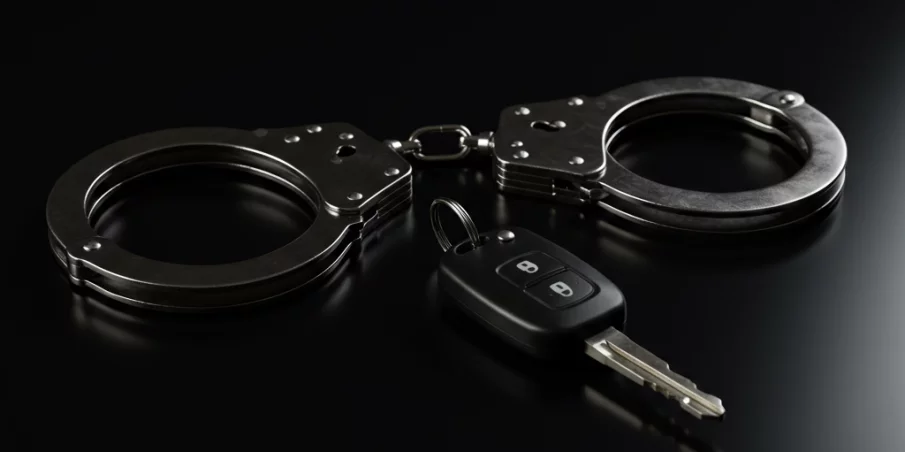DUI: Misdemeanor or Felony? Understanding the Critical Differences and What's at Stake

Picture this: you're driving home after a night out, maybe had a couple of drinks, and suddenly, you see flashing lights in your rearview mirror. Your heart sinks. Could this be a DUI? And if it is, what does it mean for you? Will it be a slap on the wrist or something much worse? When it comes to driving under the influence (DUI), the line between a misdemeanor and a felony can make a huge difference in your life. Understanding what separates these charges and what’s at stake is crucial if you ever find yourself in this situation—or if you just want to stay informed and avoid trouble. Let’s dive into the nitty-gritty of DUI charges, breaking down the differences, the consequences, and why it all matters.
What Makes a DUI a Misdemeanor or a Felony?
At its core, a DUI happens when you’re caught driving with a blood alcohol concentration (BAC) over the legal limit—usually 0.08% in most states—or while impaired by drugs, legal or not. But not all DUIs are created equal. Whether it’s classified as a misdemeanor or a felony depends on a few key factors, and trust me, these details can change everything.
Misdemeanor DUI: The “Lesser” Offense
A misdemeanor DUI is typically what you’re looking at if it’s your first time getting caught and there aren’t any major red flags. Think of it as the less severe charge, but don’t let that fool you—it’s still serious. Most states slap a misdemeanor label on a first or second DUI if there’s no injury, no kids in the car, and your BAC isn’t sky-high. For example, if you’re pulled over with a BAC of 0.09% and it’s your first offense, you’re likely in misdemeanor territory.
What makes a misdemeanor DUI? It’s usually about the absence of aggravating factors. No one got hurt, you weren’t driving like a maniac, and you don’t have a laundry list of prior DUIs. But even a misdemeanor can mess up your life in ways you might not expect, from fines to losing your license. We’ll get into the penalties later, but for now, know that a misdemeanor is the “lighter” charge—relatively speaking.
Felony DUI: When Things Get Serious
Now, a felony DUI is a whole different beast. This is where the stakes skyrocket, and the law comes down hard. Felonies are reserved for situations where the DUI crosses into dangerous or repeat-offender territory. So, what pushes a DUI into felony land? Here are the big triggers:
- Repeat Offenses: In most states, if you rack up multiple DUIs within a certain time frame (often 7-10 years), the charge can jump to a felony. For instance, in California, a fourth DUI within 10 years is automatically a felony, no questions asked.
- Injury or Death: If your DUI causes a crash that seriously hurts or kills someone, you’re almost certainly looking at felony charges. Even a first-time offender can face this if the consequences are severe enough.
- High BAC: Some states bump a DUI to a felony if your BAC is way over the limit—like 0.15% or higher. This signals extreme intoxication, and the law doesn’t take kindly to it.
- Kids in the Car: Driving under the influence with a minor in the vehicle (usually under 14 or 16) can turn a misdemeanor into a felony in many states, as it’s seen as child endangerment.
- Suspended License: If you’re caught driving drunk while your license is already suspended—say, from a previous DUI—that’s a fast track to a felony charge.
Felony DUIs carry much heavier penalties, and the long-term impact can haunt you for years. Think prison time, massive fines, and a criminal record that’s tough to shake. The difference between a misdemeanor and a felony isn’t just a label—it’s a life-altering divide.
The Consequences: What You’re Really Facing

So, you’ve got a DUI charge. What happens next? The penalties depend heavily on whether it’s a misdemeanor or a felony, and they can hit you from every angle—your wallet, your freedom, and your future. Let’s break it down so you know exactly what’s at stake.
Misdemeanor DUI Penalties: A Hit, but Not a Knockout
Misdemeanor DUIs are no walk in the park, but they’re generally less devastating than felonies. Here’s what you might face:
- Jail Time: Most misdemeanor DUIs come with the possibility of jail, but it’s usually short—anywhere from a couple of days to a year, depending on the state and circumstances. First-time offenders often get probation instead of actual jail time, especially if no one was hurt.
- Fines: Expect to shell out anywhere from $300 to $2,000 in fines, plus court costs. In some states, like California, a first-time misdemeanor DUI can cost you around $1,000 in fines alone.
- License Suspension: Your driver’s license could be suspended for a few months to a year. Some states let you apply for a restricted license to get to work or school, but it’s a hassle.
- DUI School: Many states require you to attend alcohol education or treatment programs, which you’ll have to pay for yourself. These can last weeks or months and cost hundreds of dollars.
- Ignition Interlock Device: In some cases, you’ll need to install a breathalyzer in your car that checks your BAC before you can drive. These devices aren’t cheap, and you’re on the hook for installation and maintenance fees.
Beyond the legal penalties, a misdemeanor DUI can jack up your car insurance rates or even get you dropped by your provider. It might also show up on background checks, making job hunts or apartment applications trickier. For example, imagine applying for a job as a delivery driver with a DUI on your record—good luck convincing the employer you’re a safe bet.
Felony DUI Penalties: Life-Changing Fallout
If your DUI is a felony, buckle up—the consequences are much harsher. Here’s what you’re looking at:
- Prison Time: Felony DUIs often mean state prison, not just county jail. Sentences can range from one to seven years, depending on the state and the severity of the offense. For example, a DUI causing death in Florida could land you up to 15 years behind bars.
- Hefty Fines: Fines for felony DUIs can climb into the thousands—think $5,000 to $10,000 or more. Add in court fees and restitution (if you caused damage or injury), and the costs pile up fast.
- Long-Term License Revocation: Your license could be revoked for years, or even permanently in extreme cases. Getting it back often requires jumping through hoops like completing treatment programs and proving you’re sober.
- Civil Rights Losses: A felony conviction can strip you of certain rights, like voting (while incarcerated in some states), owning a firearm, or serving on a jury. These losses can feel like a permanent mark on your life.
- Criminal Record: A felony on your record is a big deal. It can block you from certain jobs, professional licenses, or even housing. For instance, if you’re a nurse with a felony DUI, your nursing license could be suspended, derailing your career.
The ripple effects of a felony DUI are brutal. Imagine trying to explain a felony conviction to a potential employer or landlord—it’s a stain that doesn’t fade easily. And if you caused injury or death, you might also face civil lawsuits, piling financial and emotional stress on top of everything else.
State-by-State Variations: Where You Live Matters
Here’s the tricky part: DUI laws aren’t the same everywhere. Each state has its own rules for what counts as a misdemeanor or felony, and the penalties vary too. For example, in California, a fourth DUI within 10 years is a felony, but in Georgia, it’s the fourth DUI in 10 years as well. Meanwhile, states like Maryland, New Jersey, and Pennsylvania don’t even have felony DUI laws—repeat offenses just pile on harsher misdemeanor penalties.
Some states are tougher than others. Arizona, for instance, is notorious for strict DUI laws, where a BAC of 0.15% or higher can trigger an “extreme DUI” charge, and a third offense within seven years is a felony. In contrast, Wisconsin treats a first DUI as a civil infraction (not even a misdemeanor) unless there are aggravating factors like a high BAC or a kid in the car.
Why does this matter? If you’re traveling or move to a new state, you need to know the local laws. A DUI that’s a misdemeanor in one state might be a felony in another, and that could change your life in a big way. Always check the specific rules where you are—it’s worth the Google search.
Long-Term Impacts: Beyond the Courtroom

Whether it’s a misdemeanor or a felony, a DUI sticks with you long after you’ve paid the fines or served the time. Let’s talk about the stuff that doesn’t show up in the courtroom but can still turn your world upside down.
Misdemeanor DUI: A Lingering Nuisance
A misdemeanor DUI might not sound like the end of the world, but it can still cause headaches for years. That conviction could stay on your driving record for 5-10 years, depending on the state, which means higher insurance premiums or even trouble getting insured. Some employers, especially in fields like transportation or childcare, might pass you over if they see a DUI on your background check. And if you’re applying for a professional license—say, as a teacher or real estate agent—a misdemeanor DUI could raise red flags.
Then there’s the personal side. A DUI can strain relationships or make you feel like you’re carrying a secret you don’t want anyone to know. Imagine explaining to your parents or your boss why you need a ride to work because your license is suspended. It’s not fun.
Felony DUI: A Permanent Shadow
A felony DUI is a whole different level of trouble. That conviction stays on your criminal record forever in most states, unless you manage to get it expunged (which is rare for felonies). It can shut you out of entire industries—good luck getting a job in finance, healthcare, or law enforcement with a felony on your record. Housing can be another hurdle; many landlords won’t rent to someone with a felony conviction.
The emotional toll is real too. A felony can make you feel like you’re defined by one mistake, and the loss of rights—like voting or owning a gun—can feel like you’re less of a citizen. Plus, if your DUI caused harm, you might carry guilt or face ongoing legal battles from victims or their families. It’s a heavy load to bear.
Can You Fight a DUI Charge?
Facing a DUI charge, whether misdemeanor or felony, feels overwhelming, but you’re not out of options. Hiring a DUI attorney can make a huge difference. A good DUI lawyer might challenge the traffic stop (was it legal?), question the accuracy of the BAC test, or argue that the evidence isn’t solid. In some cases, they can negotiate to reduce a felony to a misdemeanor or even get the charges dropped.
For example, let’s say you were charged with a felony DUI because it’s your fourth offense. An attorney might argue that one of your prior DUIs was improperly handled or that the timeline falls outside the state’s lookback period. If they succeed, you could avoid the felony label and its life-changing consequences.
Even for a misdemeanor, fighting the charge is worth it. Reducing a DUI to a lesser offense, like reckless driving, could save you from license suspension or a criminal record. The key is acting fast—DUIs often come with tight deadlines, like 30 days to appeal a license suspension in some states.
Why It All Matters
So, why should you care about the difference between a misdemeanor and felony DUI? Because it’s not just about legal jargon—it’s about your future. A misdemeanor might feel like a speed bump, but it can still cost you time, money, and opportunities. A felony, on the other hand, is more like a roadblock, with consequences that can follow you for life. Knowing what you’re up against can help you make smart choices, whether that’s fighting the charge, seeking treatment, or just swearing off drinking and driving for good.
The best way to avoid this mess? Don’t drive after drinking or using drugs, period. Call a rideshare, crash on a friend’s couch, or hand over the keys. It’s not worth the risk of a DUI, whether it’s a misdemeanor or a felony. But if you’re already in the thick of it, understanding the differences and getting help can make all the difference.
Conclusion
According to legal experts who write for us DUI law, navigating the world of DUIs is like walking through a legal minefield—one wrong step, and things can get messy fast. A misdemeanor DUI might sting, but it’s usually manageable with the right approach. A felony DUI, though, can turn your life upside down, with penalties that hit your freedom, finances, and future hard. By understanding what separates these charges and what’s at stake, you’re better equipped to handle the situation or, better yet, avoid it altogether.
If you take one thing away from this, let it be this: a DUI isn’t just a mistake you can brush off. Whether it’s a misdemeanor or a felony, the consequences linger. Stay informed, stay safe, and keep those keys out of your hand if you’ve had one too many. Your future self will thank you.
More to Read:
Previous Posts:



